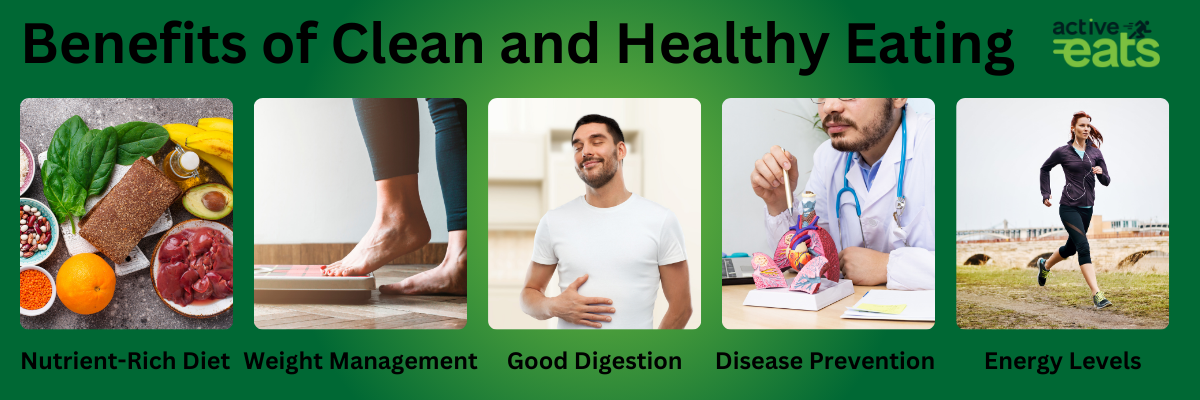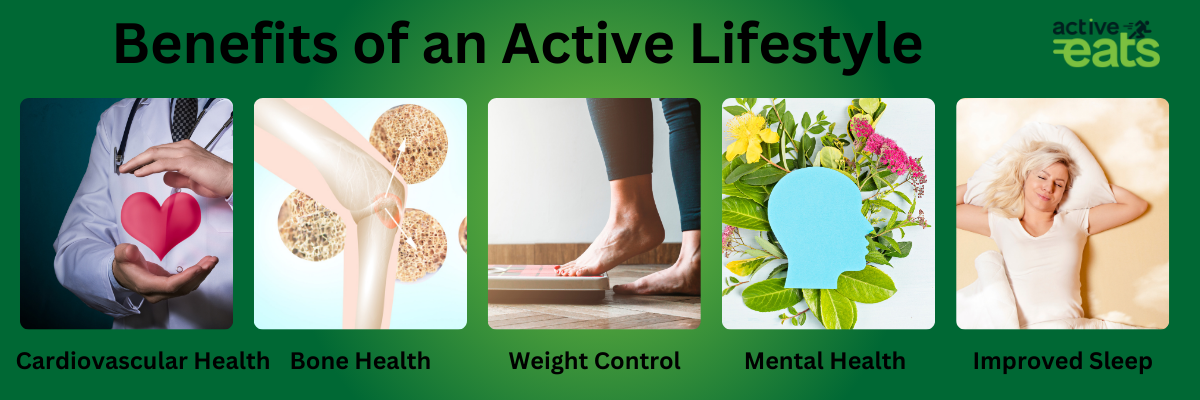Fueling Your Wellness Journey: Embracing Healthy Eating and an Active Lifestyle for a Vibrant Life
Currently, it is becoming unwise to undervalue even the greatest blessings that a balanced diet and an active life can bring. Adequate physical activity and a sound diet have proven numerous benefits as keys to a healthy body and mind. The focus will be on the benefits that sound diets and active lifestyles can have on people, with a close look at women, children, and the elderly.
The Foundations of Healthy Eating
Eating healthily and living such a lifestyle is possible only through a good balance in food and nutrition. Clean eating is one way to eat these unprocessed whole foods that supply one with the vital nutrients needed for the proper functioning of body organs. Some examples of clean and healthy foods include lean protein; good fats; whole grains; and fruits and vegetables.
Benefits of Clean and Healthy Eating:

- Nutrient-Rich Diet: Body requires vitamins, minerals, fiber, and antioxidants. To fill the gap for these essential nutrients, clean and healthy eating and nutrient dense food is here for rescue.
- Weight Management: Foods which are low in calorie and high in nutritional value like whole grains are a great choice for managing weight. The fiber content in fruits and vegetables also aids in satiety, reducing overall calorie intake.
- Disease Prevention: Cardiovascular diseases, diabetes and cancer can be avoided to a significant level by a antioxidants rich diet filled with different varieties of fruits and vegetables.
- Improved Digestion: The fiber present in whole foods supports a healthy digestive system by promoting regular bowel movements and preventing constipation.
- Enhanced Energy Levels: Clean and healthy eating provides a steady source of energy, avoiding the spikes and crashes associated with processed foods and refined sugars.
The Power of an Active Lifestyle
An active lifestyle might have a slight edge in both physical and mental health benefits. The recipe for an active lifestyle involves incorporating regular physical activity into your daily schedule, such as brisk walking, workouts, or any sports activity, because an active lifestyle can make a huge difference in your weight management and improve your heart health.
It results in positive benefits beyond physical well-being. It helps improve mental health by releasing endorphins, which are the body’s natural mood elevators. Other indications include improvement in the cardiac rhythm, reduction in stress, anxiety, and depression, among other things that come with an active lifestyle.
It can involve all people of all ages-from children to older adults, in maintaining an active lifestyle. Most especially among children, it motivates them for a longer period to be into active living. In adults, it becomes an active form of weight control, disease prevention, and energy boost. Among the elderly, this will enable them to maintain further bone health, balance, and independence.
To get all the advantages of an active lifestyle, combine it with a well-balanced nutritional diet. Stay active in physical activity, whatever your age is.
Benefits of an Active Lifestyle:

- Cardiovascular Health: Regular exercise fosters good circulation and thereby reduces the incidence of heart diseases.
- Weight Management: The most important thing exercise does for weight management is to burn calories and stimulate metabolism; along with this, it helps to maintain lean muscle mass.
- Bone Health: Walking and resistance-type training are especially good for seniors in that they increase bone strength and decrease the risk of osteoporosis.
- Mental Health: Exercising releases the “feel-good” hormone, endorphins, which leads to a good mood and minimizes stress, anxiety, and depression.
- Improved Sleep: Regular activity promotes sleep quality, which in turn is good for general health and cognitive functioning.
Children: Nurturing Healthy Habits Early
A good foundation for health is laid in a child’s life if habits such as physical fitness and nutritious diet are ingrained early on in that child. Inculcating good habits early not only aids physical development but also lays the foundation for long-term practices.
Nutrition for Growing Minds and Bodies:
- Balanced Meals: Ensure that children receive a variety of nutrients by incorporating fruits, vegetables, whole grains, and lean proteins into their meals.
- Limit Processed Foods: Reduce the intake of processed snacks, sugary beverages, and fast food, opting for whole, nutrient-dense alternatives.
- Hydration: Encourage water consumption and limit sugary drinks to support proper hydration and overall health.
- Active Playtime: Children need to be encouraged for spending more time in playing to increase their imagination and creativity.
- Outdoor Activities: Foster a love for outdoor play, whether it’s biking, playing sports, or simply exploring nature. Outdoor activities contribute to physical fitness and vitamin D absorption.
- Limit Screen Time: Set limits on screen time to promote active play and ensure a healthy balance between sedentary and active pursuits.
- Women: Nurturing Well-Being Across Life Stages
Women, with their unique physiological needs, can benefit immensely from a combination of healthy eating and an active lifestyle. During the different stages of women’s life like adolescence, pregnancy, and menopause, clean and healthy eating and an active lifestyle is very helpful.
Adolescence: Building a Strong Foundation:
- Iron-Rich Diet: Adolescent girls require increased iron intake to support growth and development. Lean meats, beans, and leafy greens rich in iron should be included.
- Calcium for Bone Health: To protect bone from osteoporosis, calcium should be included in diet. Include dairy, fortified plant-based milk, and leafy green vegetables in the diet.
- Regular Exercise: Encourage participation in sports or physical activities that align with individual interests to foster a lifelong commitment to fitness.
Pregnancy: Nourishing Two Lives
During pregnancy, it is very important to have a nourishing diet packed with all nutrients required for the well-being of the mother and the developing baby. Here’s a concise guide to fostering a healthy lifestyle during this crucial period:
- Balanced Nutrition: A diet having all nutrients and filled with fruits, vegetables, whole grains, dairy products, and lean proteins should be a priority. Folic acid, calcium, iron, and omega-3 fatty acids are some of vital nutrients required for development of the fetus, which are fulfilled by these food items.
- Hydration: Drink plenty of water to stay hydrated. Proper hydration supports the increased blood volume during pregnancy, aids in digestion, and helps prevent dehydration-related complications.
- Prenatal Supplements: Timely consume recommended prenatal vitamins by your healthcare professional. These supplements bridge nutritional gaps, ensuring both you and your baby receive the necessary vitamins and minerals for optimal growth.
- Folic Acid: Ensure sufficient intake of folic acid for fetal development by incorporating leafy greens, beans, and fortified cereals into the diet.
- Healthy Fats: Omega-3 fatty acids support brain development in the fetus. Include sources like fatty fish, flaxseeds, and walnuts.
- Moderate Exercise: Engage in moderate and safe physical activity. Prenatal exercises like walking, swimming, and prenatal yoga contribute to overall fitness, help manage weight, and prepare the body for labor.
- Adequate Rest: Prioritize sufficient sleep and rest. Pregnancy often leads to increased fatigue, so listen to your body and allow for proper recovery.
- Stress Management: Practice stress-reducing techniques such as deep breathing, meditation, or prenatal massage. Managing stress is crucial for maternal mental well-being and contributes to a healthier pregnancy.
- Regular Prenatal Check-ups: Do not skip prenatal appointments with your healthcare professional. Regular check-ups monitor the baby’s growth, address any concerns, and ensure a smooth and healthy pregnancy.
- Avoid Harmful Substances: Stop consumption of tobacco, alcohol, and illicit drugs. These substances can harm fetal development. Consultation from healthcare professionals should be done in case of any doubt.
- Monitor Weight Gain: Aim for a healthy and gradual weight gain based on your pre-pregnancy BMI. Your healthcare provider can offer personalized guidance to maintain a healthy weight throughout pregnancy.
Menopause: Prioritizing Bone and Heart Health:
Calcium and Vitamin D: At the time of menopause, chances of osteoporosis are increased. For strong bones, a calcium and vitamin D rich diet is recommended.
Heart-Healthy Choices: Healthy fats like avocados, nuts, and olive oil, which support cardiovascular health, should be included.
Weight-Bearing Exercise: Resistance training and walking are best activities to incorporate for making bones strong and reducing the risk of osteoporosis.
Elders: Aging Gracefully with Nutrient-Rich Foods and Movement
As individuals age, nutritional needs and physical capabilities change. Tailoring diets to meet these evolving requirements and staying active are crucial for maintaining health and independence in the elder years.
Nutrient-Dense Diet:
Protein Intake: Proper protein intake is a must to avoid muscle loss due to age and maintain muscle mass. Include lean meats, dairy, and plant-based protein sources.
Fiber-Rich Foods: Address digestive concerns by incorporating fiber-rich foods like whole grains, fruits, and vegetables.
Hydration: Elder people are more prone to dehydration; it is important to encourage regular water intake.
Adapted Exercise Routine:
- Take note that such activities as tai chi, swimming, and walking are low impact events. All of these are less jarring for joints and good for health promotion.
- Strength training: Have a good knack of strength training for muscles, bone density, and functional mobility.
- Flexibility and balance exercises are incorporated to minimize the risk of injury.
Conclusion
The verdict is that clean and healthy eating constitutes an active lifestyle for overall health benefits. Catering to the needs of all age groups, especially children, women, and aged persons, one can live a joyous and disease-free life. Always remember, it is never too late to start something good and healthy.


flagstoneveneydel2q9+44rk33ihoqhh@gmail.com
nihil ab dolores impedit eos corporis similique saepe rerum facilis hic veniam in qui aut quia veniam exercitationem voluptatum. incidunt minima eos amet aperiam officia tempora magnam quia voluptatem
schermerdusenberycmp5p8+44rk31b1t6ae@gmail.com
consequatur voluptatum totam rerum aspernatur ea quae aut fuga dolores nesciunt aspernatur odio. numquam non architecto totam aperiam quis error ad quaerat dolores nobis sit. sequi minus molestias vol